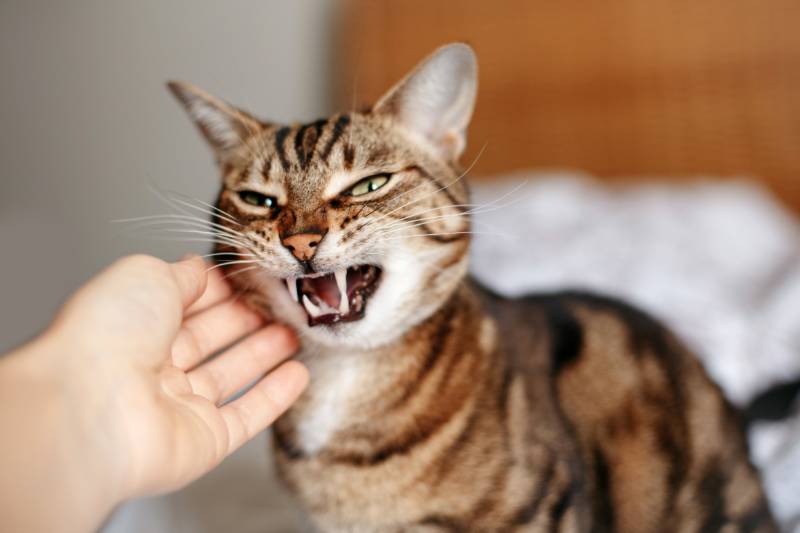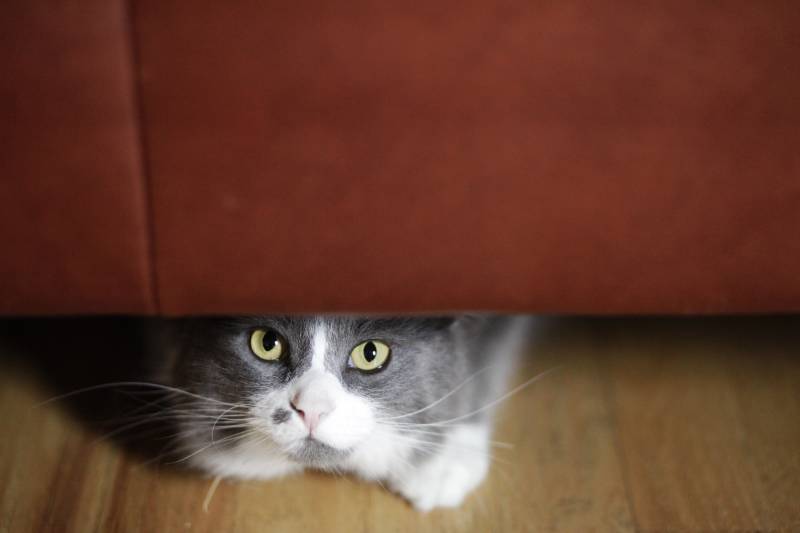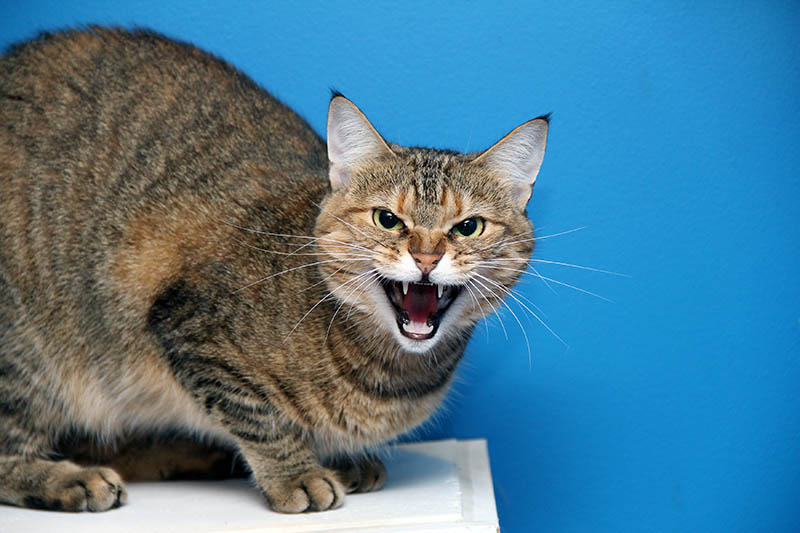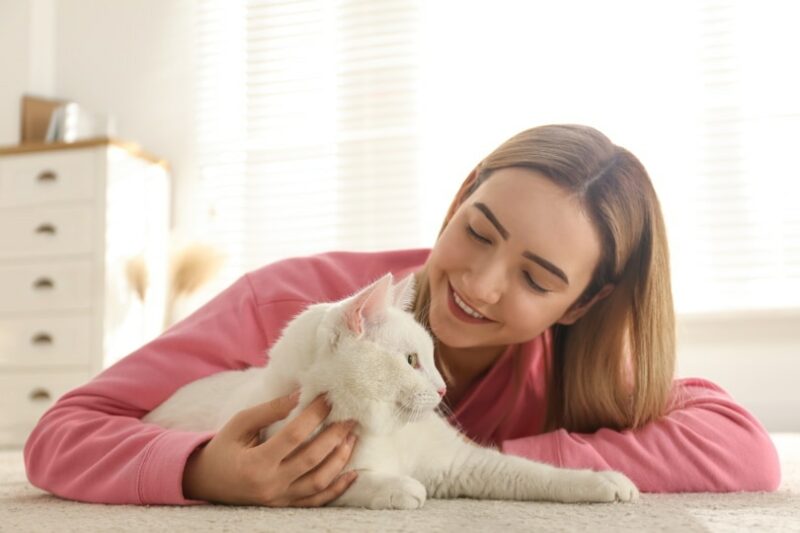Does My Cat Hate Me? How to Tell & Ways To Bond
By Jordyn Alger
Updated on

Click to Skip Ahead
Anyone who’s owned a cat knows that they can sometimes be independent and even aloof. Of course, that doesn’t stop them from being loving pets and giving you affection… on their terms, that is. However, there may be moments when you wonder if your cat secretly hates you. Unfortunately, there isn’t a straightforward way to determine whether your cat dislikes you. Negative behaviors may be an indication, but they also may be a sign of unmet needs or an underlying medical condition. Before assuming that your cat hates you, rule out the possibility of health issues. Once you’ve determined that no medical complications are at play, you can figure out why your cat seems to dislike you.
Signs That Your Cat Doesn’t Like You
If you suspect that your cat doesn’t like you, this suspicion is likely because you have experienced at least some of the following:
- Your cat hides or avoids you when you come around
- Your cat’s body is tense when it sees you
- Aggressive behaviors, such as scratching, hissing, or biting
- Urinating or defecating around the house
As mentioned, many actions humans may perceive as hatred may be your cat’s way of communicating that something isn’t right. If a medical issue isn’t the reason behind this behavior, you should look closely at your cat’s environment and ensure that your cat’s essentials are provided.
Make sure your cat has access to high-quality food and fresh, clean water. Some cats prefer water that moves, so investing in a kitty water fountain is a worthwhile expense. Check your cat’s litter box, ensuring it is clean and accessible.

Also, take inventory of your cat’s entertainment options. If your cat’s toys or climbing spaces are limited, your cat may be feeling extremely agitated as a result.
Consider the household dynamic as well. If you are gone for most of the day and don’t spend much time with your cat, it may be frustrated, bored, and lonely. On the other hand, if your house is loud and chaotic, your cat may feel frazzled and overstimulated.
If you are uncertain which environmental issues could irritate your cat, consult your vet. They can help you establish a healthier environment that you can cultivate to improve your cat’s mood.
Why Does Your Cat Ignore You?
Do you feel like your cat ignores you? If this is one of the main reasons you feel your cat hates you, here’s some good news: your cat probably doesn’t hate you.
If you are a first-time cat owner or have more experience with dogs, it is easy to feel your cat is ignoring you because it dislikes you. However, cats socialize differently than dogs do. Dogs will give you attention when you ask for it; cats will give you attention when they feel like it.
If your cat doesn’t feel like giving you attention when you ask for it, that doesn’t mean your pet hates you. It just means that your cat isn’t ready to socialize at that very moment. Give your cat some time and space; eventually, it should come around for pets and playtime.
Why Is Your Cat Aggressive?
If your cat is displaying aggressive behavior, it is understandable that you may feel that your cat doesn’t like you. Aggression can be a sign that your cat doesn’t like you, but it can also indicate that something is wrong with your cat’s health or environment.
To understand why your cat is behaving aggressively, it is important to understand what type of aggression it is displaying.
Understanding the Difference Between Defensive and Offensive Aggression
Not all aggressive behavior is the same; most hostile behaviors can be sorted into two main categories: defensive aggression and offensive aggression.
Defensive aggression occurs when your cat feels victimized. This often happens when your cat is overwhelmed, fearful, or stressed due to its boundaries being overlooked. If your cat displays defensive aggression, you may notice signs such as staying low to the ground in a protective crouch with the tail tucked under its body. Your cat may hiss and bare its teeth to force you to back away, thus avoiding further conflict. Its hair may also stand on end.
In cases of offensive aggression, your cat is the attacker. You may notice your cat swatting at you, chasing you, blocking off doorways, swishing its tail, and growling. It will often stand to appear larger with its back arched and body turned.
Once you can determine which form of aggression your cat is exhibiting, you can begin investigating the types of aggression to understand why your cat is behaving this way.

Types of Aggression in Cats
- Play aggression. During playtime, your cat may scratch, bite, or pounce due to improper socialization as a kitten.
- Fear aggression. If your cat encounters an unfamiliar person, creature, or situation, it may react aggressively due to anxiety.
- Aggression due to pain. If your cat is in pain, it may exhibit aggressive behaviors due to vulnerability. This is especially the case when you attempt to touch your cat.
- Aggression due to overstimulation. This most often occurs when you are petting your cat for too long. If your cat becomes overstimulating, it may lash out as a result.
- Territorial aggression. If you have introduced a new housemate, your cat may behave aggressively to try and establish dominance.
- Redirected aggression. When your cat is already irritated by something it cannot confront (such as another cat outdoors), it may attack you instead.
Once you have determined the reason behind your cat’s hostile behaviors, you can take steps to prevent it. For instance, if your cat behaves aggressively due to overstimulation, you can give it some space to calm down.
How to Bond with Your Cat
It’s never too late to bond with your cat. Once you discover the root of your cat’s behavioral problems and take the necessary steps to fix them, you can work on repairing your bond.
1. Give Your Cat Space
One of the most effective ways to bond with your cat is also one of the most counterintuitive: leaving it alone. As much as your cat may love you, it doesn’t want you to be in its business at all hours of the day. Recognize when your cat needs some alone time and give it space. This will foster trust between the two of you and improve your bond.
2. Establish a Routine
Cats are creatures of habit. They prefer regular routines, and without them, they can become agitated and fearful. By establishing a schedule of when you leave home, return, feed your cat, play with your cat, and give it some space, you can provide your cat security in the form of regular patterns. This will improve your cat’s emotional state and make bonding easier.

3. Let Your Cat Set the Pace of Bonding
It can be tempting to rush to petting, cuddling, and other forms of affection, but that is not an effective way to bond with your cat. Instead, it would be best if you let your cat initiate these forms of affection.
Wait until your cat approaches you, rubbing its head on you or kneading on you. Gently and slowly, so that your cat can see your hand, you can attempt to pet it. If your cat seems agitated, stop and allow it to grow comfortable before you try again.
4. Create Pleasant Associations
When you are around your cat, you want to focus on creating pleasant associations for it to latch onto. Treats, food, and toys are a great way to help your cat connect your presence to positive experiences.
5. Be Patient
The most important thing you can do is be patient. Bonding with a cat takes time, and rushing it will only cause problems in the long run.
Final Thoughts
While it can be easy to feel like your cat hates you, that is probably not the case. The more you learn about your cat’s behavior and needs, the better you can provide and create pleasant associations with your presence. With dedication and patience, you can rebuild your bond with your cat and become each other’s, cherished companions.
Featured Image Credit: Anna Kraynova, Shutterstock











